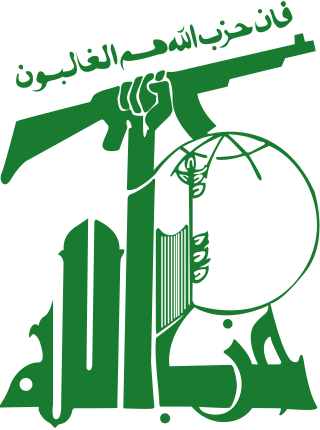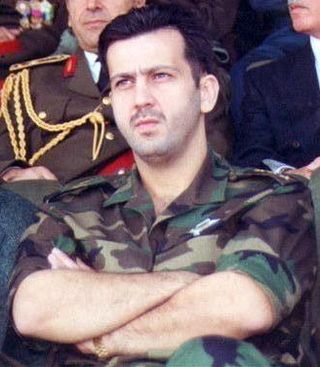
Damascus is the capital of Syria, the oldest current capital in the world and, according to some, the fourth holiest city in Islam. Known colloquially in Syria as aš-Šām (الشَّام) and dubbed, poetically, the "City of Jasmine", Damascus is a major cultural center of the Levant and the Arab world.

Hezbollah is a Lebanese Shia Islamist political party and militant group, led since 1992 by its Secretary-General Hassan Nasrallah. Hezbollah's paramilitary wing is the Jihad Council, and its political wing is the Loyalty to the Resistance Bloc party in the Lebanese Parliament.

The United Arab Republic was a sovereign state in the Middle East from 1958 until 1961. It was initially a political union between Egypt and Syria from 1958 until Syria seceded from the union following the 1961 Syrian coup d'état. Egypt continued to be known officially as the United Arab Republic until September 1971 when it was formally dissolved by Anwar Sadat.

The Syriac Orthodox Church, also known as West Syriac Church or West Syrian Church, officially known as the Syriac Orthodox Patriarchate of Antioch and All the East, and informally as the Jacobite Church, is an Oriental Orthodox church that branched from the Church of Antioch. The bishop of Antioch, known as the patriarch, heads the church and possesses apostolic succession through Saint Peter, according to sacred tradition. The church upholds Miaphysite doctrine in Christology, and employs the Liturgy of Saint James, associated with James the Just. Classical Syriac is the official and liturgical language of the church.

Bashar al-Assad is a Syrian politician who is the current and 19th president of Syria since 17 July 2000. In addition, he is the commander-in-chief of the Syrian Armed Forces and the secretary-general of the Central Command of the Arab Socialist Ba'ath Party, which nominally espouses a neo-Ba'athist ideology. His father and predecessor was General Hafiz al-Assad, whose presidency in 1971–2000 marked the transfiguration of Syria from a republican state into a de facto dynastic dictatorship, tightly controlled by an Alawite-dominated elite composed of the armed forces and the Mukhabarat, who are loyal to the al-Assad family.

Maher al-Assad is a Syrian general and commander of the Syrian Army's elite 4th Armoured Division, which together with Syria's Military Intelligence form the core of the country's security forces. He is also a member of the Central Committee of the Ba'ath Party's Syrian Regional Branch.

The Syrian Army, officially the Syrian Arab Army, is the land force branch of the Syrian Armed Forces. It is the dominant military service of the four uniformed services, controlling the most senior posts in the armed forces, and has the greatest manpower, approximately 80 percent of the combined services. The Syrian Army originated in local military forces formed by the French after World War I, after France obtained a mandate over the region. It officially came into being in 1945, before Syria obtained full independence the following year.

Fenethylline is a codrug of amphetamine and theophylline and a prodrug to both. It is also spelled phenethylline and fenetylline (INN); other names for it are amphetaminoethyltheophylline and amfetyline. The drug was marketed for use as a psychostimulant under the brand names Captagon, Biocapton, and Fitton. It is now illegal in most countries and is produced primarily for illicit use. Syria is considered to be the world's largest producer of the drug, accounting for about 80% of the global supply.

Syria, officially the Syrian Arab Republic, is a country in West Asia located in the Eastern Mediterranean and the Levant. It is bounded by the Mediterranean Sea to the west, Turkey to the north, Iraq to the east and southeast, Jordan to the south, and Israel and Lebanon to the southwest. Cyprus lies to the west across the Mediterranean Sea. It is a unitary republic that consists of 14 governorates (subdivisions). A country of fertile plains, high mountains, and deserts, Syria is home to diverse ethnic and religious groups, including the majority Arabs, Kurds, Turkmens, Assyrians, Circassians, Armenians, Albanians, Greeks, and Chechens. Religious groups include Muslims, Christians, Alawites, Druze, and Yazidis. The capital and largest city is Damascus, followed by Aleppo, Homs, Latakia, Hama, Deirezor, and Raqqa. Arabs are the largest ethnic group, and Sunni Muslims are the largest religious group. Syria is now the only country that is governed by Ba'athists, who advocate Arab socialism and Arab nationalism.

Syrians are the majority inhabitants of Syria, indigenous to the Levant, who have Arabic, especially its Levantine dialect, as a mother tongue. The cultural and linguistic heritage of the Syrian people is a blend of both indigenous elements and the foreign cultures that have come to rule the land and its people over the course of thousands of years. By the seventh century, most of the inhabitants of the Levant spoke Aramaic. In the aftermath of the Muslim conquest of the Levant in 634, Arabic became the dominant language, but a minority of Syrians retained Aramaic, which is still spoken in its Syriac and Western dialects.

The Islamic State (IS), also known as the Islamic State of Iraq and the Levant (ISIL), the Islamic State of Iraq and Syria (ISIS) and by its Arabic acronym Daesh, is a transnational Salafi jihadist group and a former unrecognised quasi-state. Its origins were in the Jai'sh al-Taifa al-Mansurah organization founded by Abu Omar al-Baghdadi in 2004, which fought alongside al-Qaeda during the Iraqi insurgency. The group gained global prominence in 2014, when its militants successfully captured large territories in northwestern Iraq and eastern Syria, taking advantage of the ongoing Syrian civil war. By the end of 2015, it ruled an area with an estimated population of twelve million people, where it enforced its extremist interpretation of Islamic law, managed an annual budget exceeding US$1 billion, and commanded more than 30,000 fighters.

The Syrian civil war is an ongoing multi-sided conflict in Syria involving various state-sponsored and non-state actors. In March 2011, popular discontent with the rule of Bashar al-Assad triggered large-scale protests and pro-democracy rallies across Syria, as part of the wider Arab Spring protests in the region. After months of crackdown by the government's security apparatus, various armed rebel groups such as the Free Syrian Army began forming across the country, marking the beginning of the Syrian insurgency. By mid-2012, the crisis had escalated into a full-blown civil war.

The Syrian opposition is the political structure represented by the Syrian National Coalition and associated Syrian anti-Assad groups with certain territorial control as an alternative Syrian government.
The Axis of Resistance is an informal Iranian-led political and military coalition in West Asia and North Africa. It most notably includes the Syrian government, the Lebanese political party and militant group Hezbollah, the Yemeni political and military organization Ansar Allah, and a variety of Palestinian militant groups.

The Iran–Israel proxy conflict, also known as the Iran–Israel proxy war or Iran–Israel Cold War, is an ongoing proxy conflict between Iran and Israel. In the Israeli–Lebanese conflict, Iran has supported Lebanese Shia militias, most notably Hezbollah. In the Israeli-Palestinian conflict, Iran has backed Palestinian groups such as Hamas. Israel has supported Iranian rebels, such as the People's Mujahedin of Iran, conducted airstrikes against Iranian allies in Syria and assassinated Iranian nuclear scientists. In 2018 Israeli forces directly attacked Iranian forces in Syria.

The Syrian revolution, also known as the Syrian Revolution of Dignity, was the series of mass protests and uprisings – with subsequent violent reaction by the Syrian Arab Republic – lasting from March 2011 to June 2012, as part of the wider Arab Spring in the Arab world. The revolution, which demanded the end of the decades-long rule of Assad family, began as minor demonstrations during January 2011 and transformed into nation-wide mass protests in March. The uprising was marked by large-scale protests against the Ba'athist dictatorship of president Bashar al-Assad, meeting with police and military violence, massive arrests and a brutal crackdown, resulting in thousands of deaths and tens of thousands wounded.

The Syrian Democratic Forces (SDF) is a Kurdish-led coalition formed by ethnic militias and rebel groups, and serves as the official military wing of the Autonomous Administration of North and East Syria (AANES). The SDF is allied to and supplied by the United States–led CJTF–OIR international alliance. Founded in 10 October 2015, the SDF claims that its mission is fighting to create a secular, democratic and federalised Syria. The SDF is opposed by Turkey, who claims the group has direct links to the PKK, which it recognizes as a terrorist group.

Hay'at Tahrir al-Sham, commonly referred to as Tahrir al-Sham, is a Sunni Islamist political and armed organisation involved in the Syrian Civil War. It was formed on 28 January 2017 as a merger between Jaysh al-Ahrar, Jabhat Fateh al-Sham (JFS), Ansar al-Din Front, Jaysh al-Sunna, Liwa al-Haqq, and Nour al-Din al-Zenki Movement. The unification process was held under the initiative of Abu Jaber Shaykh, an Islamist commander who had been the second Emir of Ahrar al-Sham.

The Wagner Group, officially known as PMC Wagner is a Russian state-funded private military company (PMC) controlled until 2023 by Yevgeny Prigozhin, a former close ally of Russia's president Vladimir Putin. The Wagner Group has used infrastructure of the Russian Armed Forces. Evidence suggests that Wagner has been used as a proxy by the Russian government, allowing it to have plausible deniability for military operations abroad, and hiding the true casualties of Russia's foreign interventions.
The Iran–Israel conflict during the Syrian civil war refers to the Iranian–Israeli standoff in and around Syria during the Syrian conflict. With increasing Iranian involvement in Syria from 2011 onwards, the conflict shifted from a proxy war into a direct confrontation by early 2018.


















